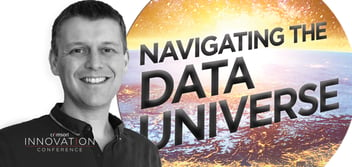Senior Spotlight: Ian Bobbett, Crimson’s Chief Data Officer
Crimson’s Head of Customer Engagement, Chris O’Brien, interviews senior technologists across the UK. Discover what drives these individuals as we delve into their careers, most exciting projects, and tech predictions for 2024 and beyond. Be inspired by their stories and connect with your IT peers.
Today’s conversation is with Ian Bobbett, who has recently joined Crimson as Chief Data Officer. Ian’s career started in his native New Zealand and has followed data science from its inception as a corporate discipline. Here, Ian talks to us about embedding a data driven culture, what advice he would give to those seeking a career in data, and just where the data function should sit within a business.
Ian Bobbett | Chief Data Officer | Crimson
Chris: So, you've just joined Crimson as our Chief Data Officer. Please tell us a bit about your background.
Ian: I actually started out in market research. My academic background is Economics and Maths, so I was always quite numerate. I started my career in market research with a small company in New Zealand, and I really enjoyed the data side of things. Then I moved to the UK and found that a career in data was much easier to get into here. I contracted in the UK for around 10 years with some great leading brands.
After about 8 to 10 years of doing that, I founded an analytics and data science company called Model Citizens (now Realise Unlimited) and ran that for about 15 years. My co-founder and I sold that company, and I now find myself as Chief Data Officer of Crimson. It’s a great company with a great culture.
Chris: You’ve obviously had quite a well-rounded career. So, what's been your biggest challenge or most challenging project to date?
Ian: Well, when my career started out, data was really new. People didn't really know what to do with it. But you could show quite a lot of benefit, quite quickly, just by doing some really sensible, uncomplicated things. By ensuring that the business understood things better, and could make evidence-based decisions, that could make quite a big difference.
The data industry has moved on quite a lot since then. Companies are generally more sophisticated now, and as the data sector has matured, they tend to ask harder questions. The harder questions are much more exciting, but they’re also a lot more challenging.
When you’ve got a complex business and poor data quality, that can be really hard to untangle, and can even stand in the way of a solution. And often the client doesn’t know that their data is poor. It can also be tricky when the client just doesn’t understand just what is possible with data. A lot of people think that data simply ends with reporting - even to this day. So explaining the true possibilities to them can be frustrating, but also great fun as it can be a real eye-opener!
Additionally, analysts and data people have historically not had the strongest communication skills. It's very hard to explain very complex concepts to the layperson and can be very challenging to do so when you understand it all so clearly yourself. One of the most crucial skills I’ve learned is to simplify as much as I can. Because comms is usually where a project fails, rather than anything technical.
Chris: I recall 5, 10, 20 years ago, data scientists were seen as your stereotypical, insular “geeks.” But now data scientists are opening up and directly interfacing with clients about what is needed from a data project, perhaps because the questions being asked of the data are becoming more complex.
Ian: Well data science has become a bit more - I don't want to use the word “sexy” but it's probably true - and it has brought in different personality types. When I was starting my career, data science was still very nascent, and the personality types were very different. Bringing in stronger communicators will certainly help the discipline.
Chris: So, how do you foster a data driven culture within an organisation?
Ian: One of the most important things to me is making sure that there's a strong value exchange. Recruiters are a perfect example here. Recruiters aren’t naturally aligned with data. They don't want to spend their time inputting information into a system. They’ve got more important things to do, let's be perfectly honest. So there has to be a strong value exchange between them entering that data and the rewards they (or the organisation) get out of it.
I don’t think that data is just there to do retrospective reporting anymore. Companies invest a lot of money in data, so that data needs to help guide the business forward and needs to be more forward thinking.
And when you have a strong use case and a strong value exchange, you’re able to demonstrate success. And when you demonstrate success, especially financial success, supply creates demand. Other departments will see the benefits that data has provided to one department and will want that for themselves.
Chris: Can you discuss the challenges of placing the data function within a business?
Ian: Data is a difficult fit within a business. Sometimes, it would get shoved in with IT, or in with marketing, when the focus of the IT and marketing departments are really elsewhere.
But that's why data really needs to be its own entity, and it needs to have a really strong line into senior management. Because data is a big agent for change in businesses at the moment. We’re in a world of AI, of rapid technological advancements, and huge amounts of data. There’s a lot of opportunity, as well as a need for control and regulation. Data increasingly needs a voice that directly feeds into the C Suite or even to the CEO depending on the company makeup.
Data still has a problem with culture. Embedding data into businesses that run on instinct or anecdote remains really complicated because you have to “myth-bust” which is not much fun! When you’re breaking a mould that people believed for years by saying “well, that’s not what the data says,” that’s a hard conversation to have. But that's never the fault of the people - it’s the fault of the company that hasn't adopted data quickly enough.
Chris: What tips would you give to someone seeking a career in data, especially to the level that you are at?
Ian: Data remains a technical role. You need to have good numeracy skills. You really can't get away with not being aligned with numbers. That is one of the few things I'd say is mandatory. That doesn’t mean you have to have a maths degree - but being comfortable with numbers and statistics is a prerequisite.
As we’ve already discussed, communication skills are increasingly important. It’s also essential to get your technicians to understand and align with commercial needs. The classic problem is that you’ve got a brilliant data scientist with a master's or PhD who is capable of conceiving of and building technically incredible solutions - but those solutions simply don’t align with a business need.
The balancing act that I walk is understanding the business’s commercial needs, cultural needs, technical needs, and the data that the business holds. There may be other things to bear in mind too - regulations for example. At this point in my career, I am knowledgeable about all of these elements, but an expert in none. As my career has progressed, I’ve moved away from hands-on analytics and more towards helping businesses grapple with problems and understand the commercial opportunity of data.
In being mindful of that balancing act, the goal is to pull those elements together into a solution that meets all of those needs. Because data is about outcomes, not about “doing data.” Sometimes, companies do lose sight of that a little bit. Managing and taking care of the data you have is fine, but now you need to get value out of it?
Chris: So, you’ve been with Crimson for three months now, how’s it shaping up? And what have you got in the pipeline to help our clients?
Ian: At the moment, my strategy is to make sure our data proposition aligns to the rest of the organisation, and making sure that everyone at Crimson comes along on the data journey. I can't do this alone! There's a lot of latent capability within Crimson and across the wider group as well.
My role at Crimson is defining that proposition so that it aligns to the rest of the business; putting systems in place that are aligned to delivering on that proposition; delivering the outcomes we want for clients; and ensuring our own infrastructure that enables that.
I want to help our clients because data will be a massive part of their future. Worldwide, and regardless of industry, if a business neglects data now, they will pay the price later. If you’re not on top of your data now - you’ll be in for a bunch of problems down the line, be they regulatory, competitive, missed opportunities, etc.
What I do is support businesses by understanding their needs, helping them put brilliant foundations in place; enabling their culture to get value from data; then accelerating their business through new initiatives, opportunities, and efficiencies - and bringing that value into the real world. I see my role as helping clients understand where data’s value lies - and understanding that it’s a lot more than simply implementing a database!
I want to help businesses shape a successful future. So those are my ambitions - so not too lofty!
Want to be our next Senior Spotlight guest? Get in touch with Chris at chris.obrien@crimson.co.uk
Want the latest market info, salary guidance, or help with your senior executive appointments? Simply email Christine Dineen at christine.dineen@crimson.co.uk, or check out our CIO resources.
Crimson is an IT consultancy, solutions provider, and recruitment agency operating throughout the UK.


